Politiques d’attribution du spectre pour étendre la connectivité mobile
Coïncidant avec le lancement du nouveau rapport de la GSMA sur la disponibilité et la tarification du spectre pour l’Afrique, cet événement discutera de l’évolution des meilleures pratiques en matière de l’octroi de spectre pour stimuler les investissements, afin d’obtenir des services haut débit mobiles de bonne qualité à prix abordables.
Organisé par le programme Spectre de la GSMA, avec des participants de tout le continent africain, le webinaire sera divisé en deux sessions.
- La première session explorera les meilleures pratiques d’octroi de licences de spectre, des études de cas internationales et les dernières recherches de la GSMA sur la tarification du spectre sur les marchés africains, ainsi que son implication sur le coût, la couverture et la qualité de service.
- La deuxième session débattra du cadre réglementaire requis pour un environnement favorable à l’investissement, et inclura les interventions par des régulateurs, des agences intergouvernementales, des communautés d’investissement et des acteurs de l’écosystème mobile.
L’équipe Spectre des Fréquences de la GSMA a rassemblé les meilleures approches pour rendre le spectre de fréquences disponible en vue de la croissance de l'accès mobile à large bande à l'échelle mondiale. Cette présentation montrera les meilleures pratiques et des cas d'utilisation internationaux réussis sur l'octroi de licences générales du spectre.
Faits saillants des dernières recherches de la GSMA Intelligence sur le prix du spectre en Afrique par rapport à d'autres marchés (développés et en développement). Cette présentation montrera comment cela a un impact direct sur le coût ainsi que sur la couverture et la qualité des services offerts aux consommateurs et aux entreprises.
Pour fournir des services haut débit mobiles abordables, répandus et de haute qualité, les opérateurs mobiles ont besoin d'un accès abordable et prévisible à un spectre radioélectrique suffisant. La fixation du prix du spectre vise à encourager une utilisation efficace d'une ressource très rare, mais elle est aussi souvent motivée par des objectifs de maximisation des recettes publiques à court terme. Cela peut avoir une influence négative sur l’attente des consommateurs, y compris des services mobiles plus coûteux et une réduction des investissements dans le réseau.
Ce panel examinera les facteurs qui influencent les investissements dans le secteur de la téléphonie mobile et ce que les décideurs peuvent faire et font pour permettre une économie numérique florissante.
Panelistes:
- Jean-Jacques Massima, Représentant de l'UIT pour l’Afrique
- Bara MBAYE, Directeur de la gestion des fréquences, ARTP Senegal
- Fatima Karim-Peters, Directeur Technique, Spectrum Regulation and Policy, Huawei Technologies
- Jerome Bezzina, Senior Regulatory Economist, World Bank
- Nezih Dincbudak, VP Regulatory Affairs, Middle East & Africa, Orange
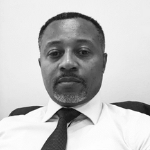
Alain Betu
Policy Manager, Central Africa
Alain is the Policy Manager for Central Africa on the Sub-Saharan Africa Policy team. He joined the GSMA in February 2019 in the Sub Saharan Africa team, based in Kinshasa and responsible for GSMA’s advocacy programmes and supporting members in policy and regulatory matters in Central Africa.
Alain brings twelve years of experience in regulatory affairs dedicated to ensuring compliance of telecommunication operators with applicable rules and regulations. During this time, he has focused his engagement with policy makers and regulatory agencies on improving the industry’s business environment.
Before joining the GSMA, Alain served as Regulatory Affairs Manager at Vodacom Congo from 2006 to 2019 where he has worked on retail and wholesale tariff regulation and license acquisitions. He contributed to Vodacom’s launch of the first 3G and 4G mobile networks in the Democratic Republic of Congo.
Alain holds an Engineering degree in Telecommunications from the Pedagogic and Technical Institute of Kinshasa (ISPT) and a Post Graduate Diploma in Business and Corporate Law from Symbiosis Centre for Distance Learning in Pune, India.

Laurent Bodusseau
Senior Director – Spectrum / Government & Regulatory Affairs, GSMA
In October 2017, Laurent joined the GSMA’s spectrum team. is responsible for the spectrum policy and regional engagement. In collaboration with the GSMA membership including mobile operators and vendors, he represents the industry with policy makers and multilateral organisations.
Laurent is also responsible for the GSMA campaign to gain access to harmonised spectrum for mobile broadband. He is leading a team of policy and regional experts to deliver spectrum expertise, policy and licensing best practice to key markets across the globe. He develops spectrum policy positions, responses to public consultations and monitors new technology developments in the communications industry. Additionally, he is responsible for capacity building on spectrum.
Laurent is a chartered engineer with over 20 years of spectrum management expertise. He lead work on a wide range of subjects such as 2G, 3G, 4G, 5G, IOT, drones, WIFI, Bluetooth, Private Mobile Radio, PPDR, GSM-R, Fixed links, Fixed Wireless Access, Programme Making and special events, satellite and broadcasting. He also lead on wider topics such as spectrum sharing and CEPT/EC spectrum management.
Laurent has previously worked for the UK Radiocommunications Agency (UK), Ofcom (UK). He then led the London Organising Committee of the Olympic and Paralympic Games spectrum programme from 2009 to 2012. After the Olympic Games, he joined the Agence Nationale des Fréquences (French administration) where he was the head of future spectrum and European Affairs. He joined the GSMA in 2017.

Seyni Malan Fati
Senior Policy Manager, SSA
Seyni Malan FATI is a Senior Policy Manager with over 14-year rich ICT Regulation experience. He is responsible for GSMA’s advocacy programs and supporting members in policy and regulatory matters in West Africa.
Before joining the GSMA, Seyni was the Head of Projects at the Smart Africa Secretariat in Kigali, Rwanda. He was mainly leading the implementation of One Africa Network project and the Free Roaming initiatives between Smart Africa members countries and before that he was the Director of Economics and Telecom Markets at the Regulatory Authority of Telecommunications and Posts (ARTP) of Senegal, from 2015 to end of 2018.
He has led and participated in several projects and studies such as the development of the strategy of the Universal Telecommunication Service of Senegal, the audit of the costs of licensed operators, the implementation of unbundling the local loop, the approval of interconnection catalogs of the powerful designated operators, the implementation of number portability, the operators QoS measurement campaigns and the identification of subscribers in Senegal. In 2017, he was one of the focal points for the West Africa Free Roaming One Area implementation.
Since 2005, He has been actively involved in ITU-RGS3-AFR and is currently Vice-Chairman of ITU-T Study Group 12 about QoS. He is also Chairman of the African regional group of the Study Group 12.
After a year of mathematics Superior in Paris, he went to the Polytechnic School of Montreal to be a Telecom Engineer in 2001 and is passionate about sports, especially football and is also a member of the Lions Club International in the Dakar Baobab club in Senegal.
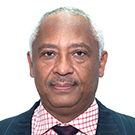
Jean-Jacques MASSIMA-LANDJI
Representative for Central Africa and Madagascar, ITU
M. MASSIMA –LANDJI Jean-Jacques is a Senior Engineer in Radiocommunications, Electronics and Computer science graduated in Paris in 1983. He is actually ITU representative, for Central Africa and Madagascar resident in Yaoundé since 2009. As Senior Adviser to the Ministry of Communications and Telecommunications of GABON, he was posted in Geneva He spent 9 years in ITU Headquarters in Geneva as the Permanent Representative of Gabon to ITU from 2004 to 2009. And at the Telecommunications development Bureau (BDT) as Coordinator of Iraq Project, from 2000 to 2004. He spent two years as Regional Director for Central Africa for ICO Global Communications, based in South Africa from 1998 to 2000.”.
Director of Posts and Telecommunications in the Gabonese administration, he managed the Telecommunications of his country during more than 15 years and was the first Chairman of the Regulatory Body of Gabon: “Agence de Regulation des Télécommunications.
Recognized as an ICT senior expert worldwide he has a proven experience of more than 35 years in the field of ICT. He contributed to the implementation of RASCOM as a continental expert and chaired RASCOM Board of Directors in 1994 and 1995. He attended most of the ICT and ITU big conferences.
He served also as a lecturer in the National School of post and telecommunications and in the African Institute of Informatics (IAI) from 1984 to 1987 in Libreville Gabon.
He is French-speaking but also graduated and in English.
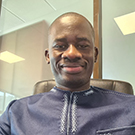
Bara Mbaye
Directeur de la gestion des fréquences, ARTP Senegal
Bara MBAYE est titulaire d’un diplôme d’Ingénieur en Informatique et réseaux des télécommunications. Il travaille au sein de l’Autorité de Régulations des Télécommunications et des Postes du Sénégal (ARTP) depuis 2009 où il a occupé les fonctions de :
2009 – 2011 : Responsable de l’ingénierie et de la Planification des Fréquences ;
2011 – 2014 : Chef du service Ingénierie et Planification des fréquences ;
2014 – 2016 : Chef du Département Contrôle et Inspection Technique ;
2016 – 2020 : Chef du Département Ingénierie et Planification des Fréquences
Depuis mai 2020 : Directeur de la Gestion des Fréquences
Il participe régulièrement aux conférences mondiales des Radiocommunications, aux réunions des commissions d’études de l’UIT-R et de l’UAT relatives à la gestion des fréquences.
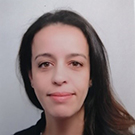
Fatima Karim-Peters
Technical Director, Spectrum Regulation and Policy, Huawei Technologies
Fatima is working for Huawei Technologies as Technical Director on Spectrum Regulation and Policy with a special focus on Middle East, North Africa and Europe. Fatima is actively contributing to spectrum regulation and policy work at global level in ITU-R, at regional level in ASMG and CEPT and at national level in collaboration with interested administrations.
Prior to joining Huawei, Fatima worked for 19 years on wireless systems for different mobile operators in different countries.
Fatima has been Senior Technology Standardization Manager and strategist for Orange Group at global level (2002-2016), in charge of elaborating, promoting and building large consensus on relevant radio standards and strategies. As such, Fatima became one of the most influential experts in 3GPP where she actively contributed to shape standards of various technologies including 5G.
Fatima also successfully managed numerous R&D projects, contributed to European collaborative projects and is co-inventor of a number of patents.
Before 2002 Fatima worked for different mobile operators (Orange Sweden, BLU Italy, SFR France and Maroc Telecom) on design, engineering, roll-out and optimization of operational mobile networks.
Fatima holds a master’s degrees from ENST Paris in wireless communications.

Jermone Bezzina
Senior Regulatory Economist , Worldbank
Jerome Bezzina is Senior Digital Economy Specialist at the Digital Development department of the World Bank (DD). He has strong experience in complex project design, negotiation, supervision and management in Africa, Middle East and Eastern Europe, a solid field experience notably in Fragile countries and a robust background in Competition, regulatory and infrastructure networks economics. Jérôme is currently leading the Digital Economy agenda in the Middle East and North Africa (MENA) Region at the World Bank and is also Task Team Leader involved in the design preparation and supervision of telecom sector reform and Digital Economy Projects in a number of West African, and Eastern Europe countries (Bulgaria, Romania).
Before joining the Bank, Jerome worked as head of the Bitstream and Broadcasting Division at ARCEP (the French regulator of electronic communications and postal services) in Paris. Prior joining ARCEP Jérôme worked as director of studies and head of the Regulatory and Policy Division at the Institut de l’Audiovisuel et des Télécommunications en Europe (IDATE). He has an experience in network economics, regulation and competition issues in the telecommunications sector in industrialized and developing countries. Before joining IDATE at the end of 2000, he worked as a modeling manager at the regulatory department of French telecommunications operator Cegetel SFR and as a professor and researcher at ENST, the French telecom high school. Jerome holds a Ph.D in Economics.

Peng Zhao
Senior Spectrum Director
Peng is responsible of the GSMA campaign to gain access to harmonised spectrum for mobile broadband. He is leading a team of regional experts and delivering spectrum policy and licensing best practice to key markets across the globe. He is also involved in various ITU activities leading to World Radio Conferences and is in charge of the WRC campaign for APAC.
Peng has an engineering background and prior to joining GSMA in 2011, Peng has worked for Orange in Switzerland and various non-profit organisations in the UK as consultant. Peng holds a MS Telecommunication Systems from Swiss Federal Institute of Technology of Lausanne. In addition to English, he is a native French and Mandarin speaker.
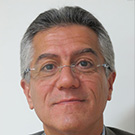
Nezih Dincbudak
VP Regulatory Affairs for Orange Middle East & Africa, Orange
Nezih Dincbudak is currently the VP Regulatory Affairs for Orange Middle East & Africa. He works with Orange Group since 20 years. Within his position, he leads and implements Orange regulatory and strategic positions in MEA operations, assists Group operational companies with national authorities (Governments, Regulatory & Competition Authorities), provides regulatory strategy, support and assistance to Orange countries in the footprint and to Group international development activities. Previously, he held several positions within Orange: Director Regulatory Affairs for Orange Europe, Director Strategy and Convergence Europe, Deputy Director UMTS Program at Orange France and Director of Carrier Relations for various Orange fixed & mobile subsidiaries.
